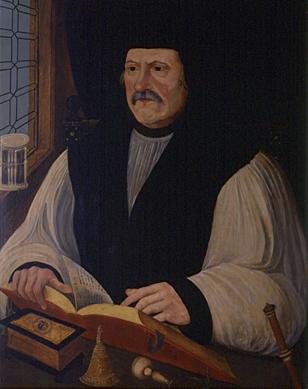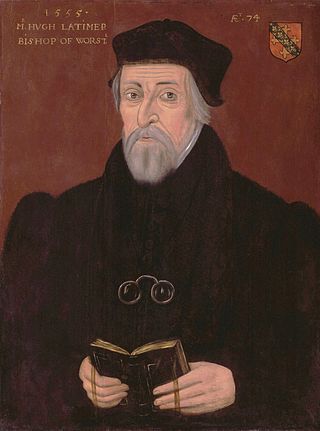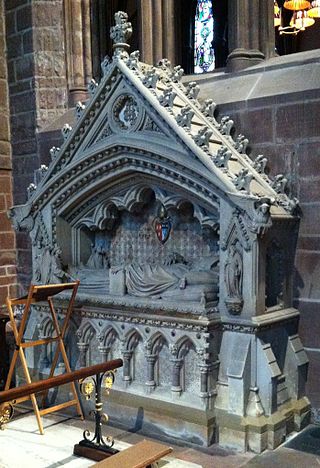
Robert Shorton (died 17 October 1535) was an English churchman and academic, first Master of St John's College, Cambridge and Archdeacon of Bath.

Robert Shorton (died 17 October 1535) was an English churchman and academic, first Master of St John's College, Cambridge and Archdeacon of Bath.
He was one of the earliest scholars of Jesus College, Cambridge. He graduated B.A. in 1501 and M.A. in 1503, and was elected fellow of Pembroke Hall on 24 November 1505. [1] In 1507 he was chosen to preach before the university, and in 1509 graduated B.D., and was selected to read the divinity lecture instituted by Lord Chief Justice William Hussey. On 9 April 1511 he was appointed the first Master of St. John's College, newly founded by Lady Margaret Beaufort. Shorton superintended the progress of the work of building the college, resigning his office before 1517.
He was already dean of the chapel to Thomas Wolsey, and through Wolsey's influence he received preferment. On 1 November 1517 he obtained the prebend of Donnington in the diocese of York, which on 7 May 1523 he exchanged for that of Fridaythorpe in the same see. In October 1518 he was chosen master of Pembroke Hall, and in the same year was appointed rector of Sedgefield, County Durham. On 7 May 1522 he was appointed rector of Stackpole in Pembrokeshire, and on 14 April 1523 he received the prebend of Louth in Lincoln Cathedral. About this time he was of service to Wolsey in selecting scholars at Cambridge to be invited to join Wolsey's new Cardinal College at Oxford. He received the honorary degree of D.D. from Oxford in 1525.
On 8 April 1527 he was installed canon of Windsor. He was also Queen Catherine of Aragon's almoner, and, as a staunch Catholic, adhered to the Queen when the divorce question arose. He was one of the few clergymen who supported her cause in convocation. In 1529 Catherine appointed him Master of the college of Stoke-by-Clare in Sussex. In 1534 he resigned the mastership of Pembroke Hall, increasingly a Protestant institution. He became archdeacon of Bath in 1535, and, dying on 17 October of the same year, was buried at Stoke-by-Clare. By his will he left money to four Cambridge colleges.

Matthew Parker was an English bishop. He was the Archbishop of Canterbury in the Church of England from 1559 to his death. He was also an influential theologian and arguably the co-founder of a distinctive tradition of Anglican theological thought.

Hugh Latimer was a Fellow of Clare College, Cambridge, and Bishop of Worcester during the Reformation, and later Church of England chaplain to King Edward VI. In 1555 under the Catholic Queen Mary I he was burned at the stake, becoming one of the three Oxford Martyrs of Anglicanism.

Henry Grey, Duke of Suffolk, 3rd Marquess of Dorset, was an English courtier and nobleman of the Tudor period. He was the father of Lady Jane Grey, known as "the Nine Days' Queen".
William Knight was the Secretary of State to Henry VIII of England, and Bishop of Bath and Wells.

Lorenzo Campeggio was an Italian cardinal and politician. He was the last cardinal protector of England.
Richard Sampson was an English clergyman and composer of sacred music, who was Anglican bishop of Chichester and subsequently of Coventry and Lichfield.

Charles Moss was an Anglican clergyman who served as Bishop of St David's from 1766 to 1774 and Bishop of Bath and Wells from 1774 to 1802.

The Rev. John Graham was an English churchman and academic. He was master of Christ's College, Cambridge from 1830 to 1848 and Bishop of Chester from 1848 to 1865. Graham died at the Bishop's Palace, Chester, on 15 June 1865, and was buried in Chester cemetery on 20 June 1865. He tutored Charles Darwin at Cambridge from 1829 to 1830.
Thomas Wynter or Winter was the Archdeacon of York, Richmond, Cornwall, Provost of Beverley, Dean of Wells Cathedral and the illegitimate son of Cardinal Thomas Wolsey.
Roger Leyburn was an English churchman and academic, Master of Pembroke Hall, Cambridge, archdeacon of Durham and bishop of Carlisle.
Richard Layton or Leighton (1500?–1544) was an English churchman, jurist and diplomat, dean of York and a principal agent of Henry VIII and Thomas Cromwell in the Dissolution of the Monasteries.
Thomas Gerard (1500?–1540) was an English Protestant reformer. In 1540, he was burnt to death for heresy, along with William Jerome and Robert Barnes.
Peter Vannes was an Italian Catholic churchman who became a royal official in England, and Dean of Salisbury.
William Franklyn (1460–1556) was an English churchman, who became dean of Windsor.

William Cooke (1711–1797) was an English cleric and academic, Provost of King's College, Cambridge from 1772 and Dean of Ely from 1780.
Richard Woleman or Wolman was an English churchman, Archdeacon of Sudbury from 1522; and the Dean of Wells between 1529 and 1537.
Thomas Bacon was the fifteenth master of Gonville Hall, Cambridge from 1552.
John Pory (1502/03–1570) was an English churchman and academic, Master of Corpus Christi College, Cambridge.
Robert Birkenshaw D.D. was a Canon of Windsor from 1512 to 1525
Humphrey Tyndall was an English churchman who became the President of Queens' College, Cambridge, Archdeacon of Stafford, Chancellor of Lichfield Cathedral and Dean of Ely.